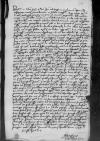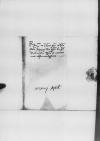Ego iuxta Reverendissimae Dominationis Vestrae voluntatem prorsus me paro ad comitia proxima. Sed mordet rursum me, quod video non sine mei ludibrio futurum, si inde mihi huc sit regrediendum non acceptis videlicet litteris Romanis. Nam mihi non persuadeo ⌊regiam maiestatem⌋ quicquod quicquam sibi in hac re sumpturam praeter auctoritatem pontificis et quod hic ⌊Nicolaus Plotowski⌋ de iam allatis litteris rettulit, dubito, an non ipsum fallat. Quod si ita habet, rogo, Reverendissima Dominatio Vestra mihi consulat, quid agam, ne quid temere aggrediar. Si enim huc redeundum est, certe praestabit non movere me loco, nam et in comitiis illis, quo loco futurus sim, non intelligo. Misi tamen iam, qui hospitium curaret. Dignetur Reverendissima Dominatio Vestra sine mora impertiri mihi consilium suum et sententiam suam perscribere, ex qua pendeo totus. In causa Reverendissimae Dominationis Vestrae cum ⌊domino cantore⌋ post proxime scripta nihil est actum, hactenus festis impedientibus. Nunc cur rem protelet praesidens noster, ignoro, nisi forte propter adventum domini decani, qui exspectatur. Si cras non congregabit ⌊capitulum⌋, admonebo hominem, ne perducat longius negotium. Fecit haec res, ut quae Reverendissima Dominatio Vestra in negotio ⌊domini Pauli⌋ dispensatoris mandavit, nondum sint effecta, neque efficientur adhuc aliquantisper, ne videlicet exacerbemus animum domini ⌊Alexandri⌋, quem refert integrum servari in hoc negotio ⌊domini cantoris⌋, donec, quae capitulariter agenda sunt, sint constituta, neque periculum inde aliquod eveniet domino Paulo, si non fiet exsecutio citationis, quam nondum credo hic adesse credo. Si vero est, curabo bonis modis, ut differatur exsecutio, quam alioqui nemo etiam faciet, dum ⌊ille⌋ est in aula Reverendissimae Dominationis Vestrae. Haec etiam domino ⌊doctori Nicolao⌋ visa sunt in rem Reverendissimae Dominationis Vestrae esse, cui si quid diversum videbitur, scribere quam primum dignetur, ac etiam hoc expendere, sitne duriusculum futurum, si ita haec in ⌊capitulo⌋ referantur, ut ipsa iussit. Refert enim fortasse, ne eo protrahatur homini de Reverendissima Dominatione Vestra existimatio, quasi velit cuiquam viam praecludere ius suum prosequendi. Nam exemplum plus solet hic timeri, quam res, quae ad praesens agitur. Mihi certe videretur consultius, ut privatim res ac cum citra exasperationem cum ⌊domino Alexandro⌋ ageretur, qui non patietur periculo suo aut cum Reverendissimae Dominationis Vestrae offensa quicquam agi. Exspecto si quid aliud iusserit Reverendissima Dominatio Vestra, cui sine cunctatione obsequar.
Heri quidam domini ⌊ducis Prussiae⌋ tubicen hic diversatus forte meminit se per Insulam Maiorem iter facientem repperisse in via publica litteras episcopali signo clausas, quas ego suspicatus esse Reverendissimae Dominationis Vestrae, ab illo poposci ac his additas remitto certior factus dominum ⌊castellanum Gdanensem⌋ ante his diebus mandato regio peregre hinc profectum esse. Mitto Reverendissimae Dominationi Vestrae silurum, qui fortasse tempestivius sub Quadragesimae tempus advenisset, sed quem spero etiam nunc ex me gratum Reverendissimae Dominationi Vestrae futurum munus, etsi exiguum, tamen ob raritatem istic fortasse carum. ⌊Plotowski⌋ noster pollicitus est vivum aff reddere, bene videlicet potum. Cupio Reverndissimae Dominationi Vestrae esse intime commendatus ipsamque felicem valentemque peragere vitam.


 AAWO, AB, D. 2, f. 94v
AAWO, AB, D. 2, f. 94v